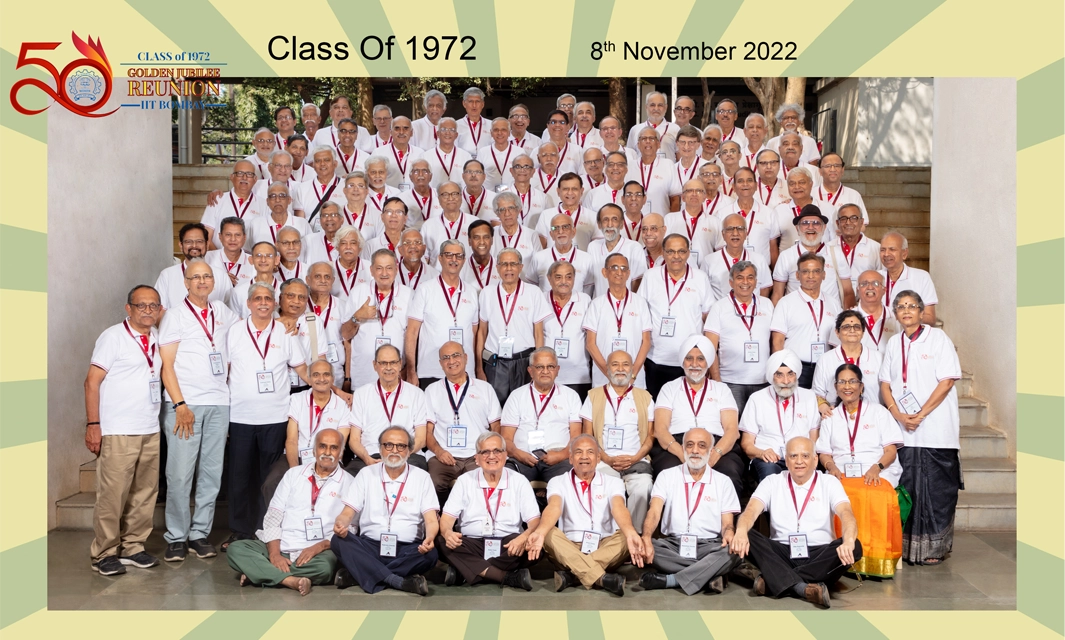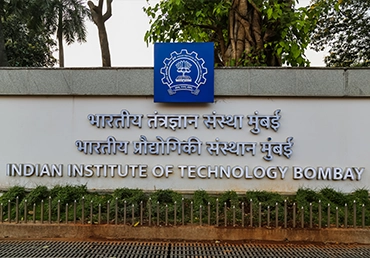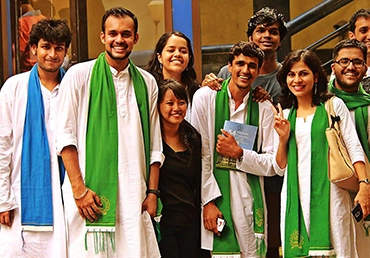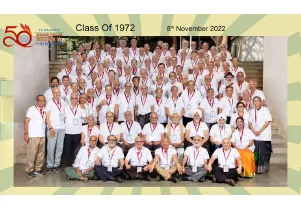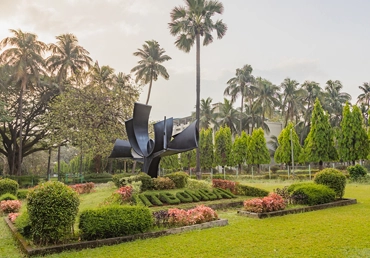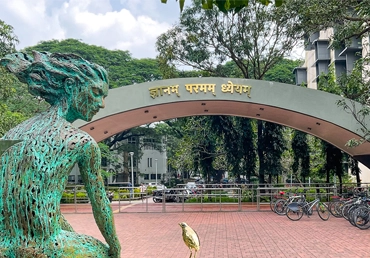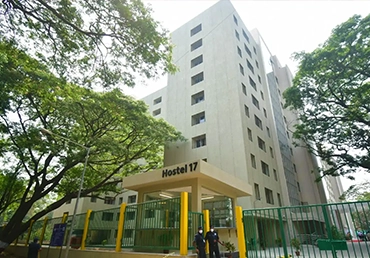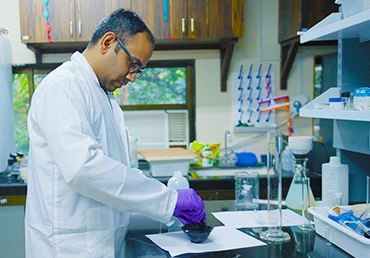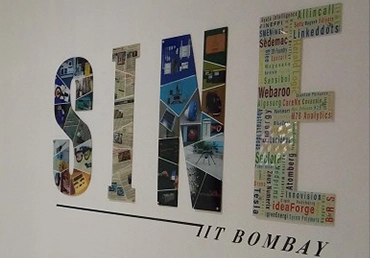The Class of 1964 is meeting for the Dimond Jubilee Reunion this year in December. The batch is collectively working on raising funds, and post-reunion, we will be in discussion with the batch leaders for fund utilization.
The Batch Legacy initiative is a part of IIT Bombay’s Legacy (Golden, Ruby, Silver, and Decennial Jubilee) Project, where alumni from specific batches come together to make a unified donation, towards fulfilling some of the greatest needs of the Institute.
Click on the years below to get details on the various batch legacy projects at IIT Bombay.
- 1962-1970
- 1971-1980
- 1981-1990
- 1991-2000
- 2001-2010
- 2011-2020
- 2021-2030
1962-1970
The alumni of IIT Bombay’s 1967 batch, led by Mr. Dipak Himatsingka and Dr. Arakali Lakshminarayan Ravimohan, spearheaded a campaign to establish the prestigious ‘Prof. N. R. Kamath Distinguished Institute Chair Professorship’ in honor of their esteemed teacher. This chair has become renowned for its ability to attract exceptionally accomplished researchers from around the world to IIT Bombay, showcasing the enduring impact of their visionary mentor on the institute.
The Prof. N. R. Kamath Chair Professorship holds immense prestige, bringing unparalleled visibility and honor to the institute. The opportunity to host these remarkable individuals has been a privilege that greatly benefits the intellectual community of faculty and students at IIT Bombay. Through their visits, workshops, seminars, and interactions with students, these distinguished professors make significant contributions to student learning and academic excellence.
Attending events organized by the chair, students have gained valuable knowledge, sharpened their critical thinking abilities, and improved their collaborative skills. These outcomes have played a pivotal role in nurturing the overall academic excellence of the institute, equipping students with the necessary competencies and knowledge for successful careers in their respective fields of study.
Due to the increase in the intake of students and the doubling of room occupancy, most students preferred to study in study rooms instead of their own rooms. But hostels, especially the old legacy ones, did not have a dedicated study room. Hence with, the generous funding from the class of 1969 has supported the creation of study rooms in hostels 3 & 6.
The batch also has supported the conversion of lighting into campus to LED, which will not only increase the quality of lighting in the institute but also save a significant amount of cost for the institute. These lightings will also help reduce the carbon footprint of the institute and help it towards its aim towards sustainability.
Along with these, the batch also generously supported the Financial Aid Program, which provides aid to economically needy students.
1971-1980
The Class of 1971 will be visiting the campus in December 2022 to celebrate their golden jubilee reunion. We are discussing with the batch leaders to figure out what is the best use of the legacy funds collected.
The Class of 1972 created an endowment for hostel maintenance. The purpose is to ensure the upkeep of the hostels. The batch donations were allocated to some of the hostels on campus according to their needs. The Class of 1972 will be visiting the campus in November 2022 to celebrate their golden jubilee reunion. We are discussing with the batch leaders to identify the best use of the legacy funds collected.
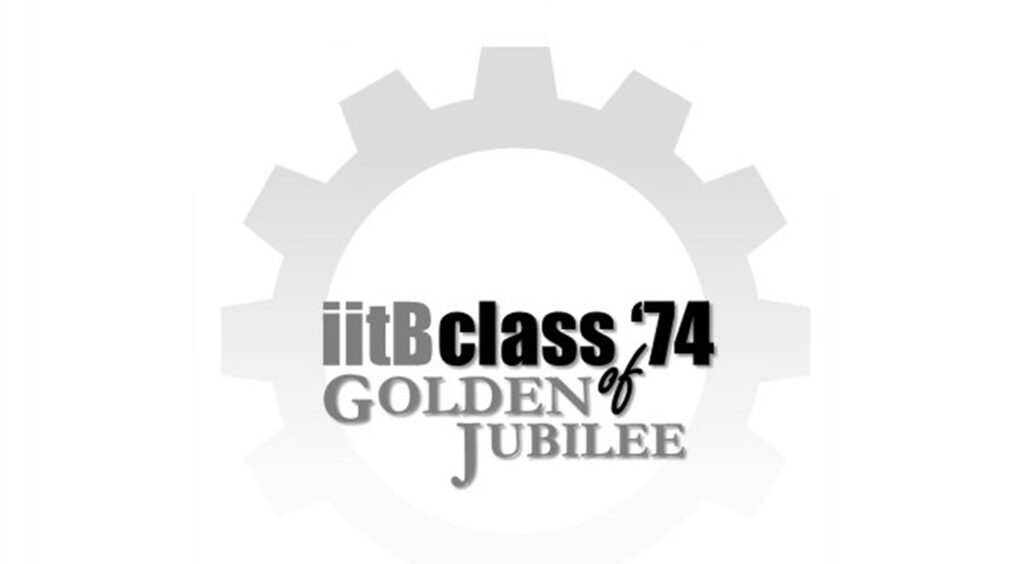
2024 will mark our batch’s Golden Jubilee Year, 50 years since our graduation from IIT Bombay, and a milestone surely worth celebrating! No one could have foretold in 1974 where each of us would find ourselves today, but the foundations we built at IIT surely played some part in it.
The Class of 1974 Legacy Gift is a way for us to say thanks for all IIT Bombay has done for us, meant to us and for the amazing memories we hold and cherish. We have set a goal of Rs 4 crores, we have already raised Rs 50 lakhs, we hope we can do significantly more. It would be wonderful if we could get everyone to participate, no matter the amount you contribute. Let’s work together to make this a truly memorable campaign!
The Class of 1975 initiated the tinkerer’s lab project aimed at providing technical resources and training to students on the campus interested in technical student-led activities. The program was very well received by both the students and the faculty. The funding was also utilized for other purposes like computer networking in hostels, Gymkhana, and cultural complex.
We are reaching out to the batch leaders to utilize or repurpose the funds that remain from the batch contributions.
The Class of 1980 celebrated their Ruby Reunion in 2020 and as part of their Legacy project, they decided to support several initiatives at their alma mater.
Design & Making Lab:
The proposed Design and Making Lab will conduct the Engineering Drawing Workshop for all the first-year B.Tech students at IIT Bombay. Each year, more than 1400 students enrol for the workshop and the number continues to grow. The lab will allow students to gain access to state-of-the-art equipment for mechanical and electronic work including 3D printers, laser cutters, the latest workstations with CAD (Computer-aided Design software), and a complete electronics setup.
The lab will introduce students to the latest design and making practices close to industry standards and invigorate their inner engineers and encourage them to find innovative solutions to problems.
Thanks to the generosity of the class of 1980, the lab will benefit generations of students to come.
Rejuvenation of Powai Lake
The scenic and breathtaking Powai Lake overlooking IIT Bombay’s Powai campus has deteriorated over the years due to the increase in silting, rapid growth of water hyacinths, weeds, and eutrophication of the lake. This prompted the class of 1980 to launch the “Revitalization of Powai Lake” scheme with the objective of restoring the lake to its original pristine and sustainable state by adopting eco-friendly designs and materials for its restoration.
Considering the enormity of the project which also involved desilting and the removal of the water hyacinths from the lake environs, the project was planned in two phases.
The first phase involved developing the space behind the Convocation Hall lawns up to the lake into Kshitij Udyan (garden), a landscaped patch, and a Nature Trail (a walking path winding through the trees). Phase 2 involved coordinating with the municipal agency MCGB with activities involving the desilting and cleaning of the lake area.
While the two-phased project seemed enormous considering the municipal agency’s involvement, active members from the Class of 1980 took it upon themselves to pursue their plans and bring them to fruition. Initially, alumni members were to simply provide project management support and select the perfect architects for the job, but soon, that changed. With a view to facilitating the timely completion of the project for various upcoming functions, it was decided that the class of 1980 would handle the entire project on their own.
Kshitij Udyan – the landscaped garden behind the Convocation Hall – was finally inaugurated in 2008 and all the other associated activities were completed soon after.
1981-1990
The Financial Aid Program (FAP) was started in 2007 by the Class of 1981 to provide educational funding to students with social and economic disadvantages.
The FAP scholarship is a peer-to-peer scholarship with the students expected to pay back the scholarship when they are financially stable once they graduate, which will then fund other needy students. All students across all programs and disciplines are eligible for support.
FAP covers the entire registration fee of students, including tuition fees, mess bills, etc. Other value additions added in recent years include mentoring opportunities, industrial visits, etc. Most students donate back the money in timelines suited to their individual situations once they secure a job, thus keeping the endowment perpetual and growing.
Almost each legacy batch adds some money to the endowment pool, thus ensuring that the endowment continues to grow and help students in need.
The class also supported the Mess Workers Incentive Fund, which was used to benefit the mess workers working in the hostel mess. The batch also provided Fellowships to promote research in the Centre for Technology Alternatives for Rural Areas (CTARA).
The YFA existing funds need to be topped up on an annual basis to ensure the perpetuity of the program. The class of 1983 generously contributed to the award.
The Retired Faculty Wellness Fund (RFWF) is a supplementary medical insurance program initiated by the Class of 1984 as guru Dakshina for their retired teachers. Faculty who retired before 2003 had no medical coverage offered by the Institute. Many of the teachers were well into their 70s and lacked adequate medical coverage at a time when they needed it the most. Thus, the corpus for Retired Faculty Wellness Fund was created with over 150 faculty members as beneficiaries. The initiative provides supplementary medical insurance from ICICI Lombard to all retired faculty members (and spouses) who retired before 2003. The entire annual premium for this closed group policy is paid from the Retired Faculty Wellness Fund. The initiative began as a legacy project by the class of 1984 and is supported by other successive batches. Over the 6 years, this initiative has also witnessed a landmark expansion in terms of the scope of its impact. The program has been instrumental in providing support in terms of health insurance for hundreds of faculties who have now retired from IIT Bombay.
The generous funding from the class of 1985 has supported Chair Professorship in Technology and Sustainable Development. Prof. Parag Bhargava (2021-2024) from the Department of Metallurgical Engineering and Material Science currently presides over the chair.
The Class of 1985 has also supported Entrepreneurship Cell: Eureka, Retired Faculty Wellness Fund, and Young Faculty Award.
IIT Bombay’s Class of 1985 supported Eureka by sponsoring events, awarding prizes, helping create a seed fund, and supporting outreach activities. In 2010, THOMSON REUTERS declared ‘Eureka!’ as “Asia’s Largest Business Model Competition.”
Class of 1986 is the first batch to initiate a project for students’ mental well-being. The objective was to create awareness and augment life and productivity skills among the IITB students. They gregariously promoted the importance of Preventive and Positive Mental Health Work through mentor training, professional counseling, workshops, exhibitions and films, parents’ orientation programs, and other outreach activities. Narcotics Control Board complimented IITB on involving students in spreading awareness against substance abuse.
We would like to thank the class of ’87 for their generous contribution. The class has donated funds to promote academic and research activities, faculty welfare, and student assistance. Their Legacy Project consisted of the following initiatives:
Technology and Development Solutions Cell: This program was initiated as a center under CTARA to enable IITB to carry out academic activities and research as well as accept and deliver projects which will apply technology to solve the developmental problems of rural areas.
Student’s Financial Assistance: The batch initiated this program to support the financial needs of financially constrained students. We are reaching out to the batch leaders to utilize or repurpose the funds that remain from the batch contributions.
We would like to thank the Class of 88 for their generous contribution.
The class decided to fund the following initiatives through these donations:
EE Department Laboratory Fund: The batch contributed to the EE department to specifically support the activities of the innovation laboratory of the EE department.
Scholarship – Legacy of 1988: The batch created an endowment, the interest of which goes towards supporting the financial needs of underprivileged students.
We are in the process of reaching out to the batch leaders to utilize or repurpose the funds that remain from the batch contribution.
We would like to thank the Class of 88 for their generous contribution.
The class decided to fund the following initiatives through these donations:
EE Department Laboratory Fund: The batch contributed to the EE department to specifically support the activities of the innovation laboratory of the EE department.
Scholarship – Legacy of 1988: The batch created an endowment, the interest of which goes towards supporting the financial needs of underprivileged students.
We are in the process of reaching out to the batch leaders to utilize or repurpose the funds that remain from the batch contribution.
The Class of 1990 had its silver jubilee Reunion in December 2015. The batch initiated various projects with the funds collected as part of their Legacy Project over and above the regular projects covered by the Legacy batches. These projects are listed below:
- IIT Bombay Vaccination Drive: In the institute’s effort to secure the campus by vaccinating all campus residents, IIT Bombay had to raise funds for staff that could not afford the vaccines. Class of 90 responded immediately to the call and funded the vaccination of more than 100 of the staff on a very urgent basis.
- IDEAS: The innovation, Development & Entrepreneurship Program with Alumni Support was initiated to provide resources and to foster innovation at IIT Bombay for furthering entrepreneurship.
The IDEAS program has come into full force since August 2018. Students have benefitted in finding their entrepreneurial drive, learned to choose an idea to pursue, and figured out the right steps to create the venture. 19 teams have participated in two cohorts of the Level 1 program, and 10 teams were selected in the first cohort of Level 2. 10 teams out of these are still actively pursuing their ideas. In total, the teams have so far raised more than Rs. 12 Crore in grants, prizes, or equity financing beyond the IDEAS program. We see that there are many noteworthy startups out of IDEAS that decipher a real problem and have become even more germane in the post-COVID world. For example, ‘HelpNow’ which is a med cab/ambulance provider reducing the exigency response time, ‘Apli.AI’ which provides a platform for companies to appoint from nationwide campuses digitally, ‘AiRTH’ which has prospered with a quirky and highly coherent filter to purify the air and many more. The work done by IDEAS is extremely commendable and is like a beacon of light that clears the vision and path of IITB students.
- Clean Green Campus Program: The objectives of the Clean Green Campus Program are – to facilitate the creation of a Model Clean, Green Campus at IIT Bombay that will be the Benchmark of every other academic institution in India and to institutionalize a legacy project that is inspiring and sustainable for every future batch to contribute.
Bio-Gas Plant: As part of the Clean Green Campus Program, a 2-tonne Bio-Gas plant was set up to utilize food waste from a set of hostels and to increase the green energy footprint of the campus.
The plant will reduce energy costs and drive sustainability. As IITB had one precedent of a poorly functioning earlier bio-gas plant, and the Class of 1990 had to work twice as hard with the Dean – IPS to ensure that this plant was in the right place, had affordable setup and running costs and had the appropriate resourcing and systems to ensure that it functioned to capacity. The site is just off H-12/13/14. It is fed food waste from five to six hostels, and the energy generated is piped to the 12/13/14 kitchen; With over two tons of organic waste fed to the plant each day, the plant generates around 144 Cubic Meters of Biogas daily, which is enough to supplement 3 – 4 industrial scale LPG cylinders daily. Apart from repurposing the waste, the project saves more than 15 Lakh Rupees in LPG costs every year, effectively paying for itself over the span of four to five years.
Energy Efficient Bulbs and Fans: Apart from the biogas plant, energy-efficient LED Bulbs and BLDC fans were fitted into Hostels 12, 13 & 14. The bulbs consume 30% less electricity compared to normal bulbs, while the fans save up to 40% more energy compared to normal fans for the same output. This has significantly worked towards reducing the energy consumption of these hostels and reducing their carbon footprint. We hope the other batches and hostels will follow suit, which will be the norm in all buildings across the campus.
With the precedent set up by the class of 1990, such biogas plants and energy-efficient light bulbs will become a part of every new hostel at IITB.
- ARTS@IIT Bombay: As part of the class project, various art projects were installed at some of the most prominent locations on the campus. These will serve as a reminder of the contributions of our alumni to the institute.
1991-2000
The Class of 1991 had its silver jubilee Reunion in December 2016. The class has generously supported the retired faculty wellness fund, which is being used for the benefit of IITB faculty, which retired without health insurance.
We are in discussions with the batch to figure out the best use of the remaining funds collected as part of the legacy project.
- Along with their regular projects, the 1992 batch undertook several novel initiatives as part of their Legacy Project which focused on a wide variety of issues.
Café 92
- Some of the fondest moments in any student’s life at IIT Bombay are the ones spent socializing with friends at the various cafes around the campus. More than their classwork, attending labs, or studying hard for their exams, students remember sharing Maggi noodles and chai with their friends at their favourite hangout spots. Keen to provide the same experience to the current group of students at IIT Bombay, the class of 1992 contributed to the building of Café 92 which is located close to IIT Bombay’s main building and is surrounded by lush green trees and nestles amidst a wonderfully scenic locale on campus. Already, Café 92 is a favourite hangout spot for students as they get together and unwind with their friends, sip on hot chai and coffee, munch their way through a scrumptious array of snacks and make long-lasting memories.
BANDHU
If getting into IIT Bombay is one of the toughest experiences a young student goes through, getting into the Institute and studying amidst a high-pressure environment takes its toll on their mental health. As ambitious and high-ranked students from all over India come together, the competition is ferocious, and the expectation to excel increases exponentially. This constant pressure leads to mental illnesses like depression and anxiety. The results of a survey conducted showed that more than 60% of students on campus suffered from mental ailments with no recourse. This prompted the class of 1992 to launch Project BANDHU which includes several initiatives like 24*7 online counselling, a self-help website, socio-emotional workshops, and more. Project BANDHU has more than 7.5k users now and over 12 workshops have been conducted so far with 100+ students. The program has proven to be a tremendous success and beneficial for students and the initiative will go a long way toward prioritising mental health and institutionalizing student well-being at IIT Bombay.
Hostel Study Rooms
Most of the students prefer to study in study rooms as opposed to their own personal hostel rooms which can be cramped and distracting. Until now, the only study room available for students were in the various departments or the library. It was extremely inconvenient for students given the long commute from their hostels to these study rooms. Not to mention – the number of study rooms available was proving to be insufficient given the increase in student capacity on campus. Therefore, the class of 1992 created air-conditioned study rooms for hostels 3, 9, and 11 which will be highly beneficial for the students in these hostels. As things stand, study rooms will become an inherent feature of all hostels in the future.
Student Travel Fund
The travel grant support extended by the class of 1992 helped 16 undergraduate students present their academic papers at international conferences.
“The conference was a major success in my professional life. It helped me gain confidence and enhanced my soft skills. I interacted with a lot of professionals, both from academia as well as industry, which helped me to improve my understanding of the Core Mechanics field. The travel grant really helped me finalize my career plans. I look forward to doing a Ph.D. in the future and will always be indebted to the selfless donation from the class of 1992.”
Hrushikesh Sahasrabuddhe, Metallurgical Engineering and Material Science Department
SINE Tech Incubator Funding
Thanks to the generous contribution made by the class of 1992, the tech incubator and accelerator of IIT Bombay, SINE, has incubated more than 190 startups and employs 5000+ people.
SINE was launched in 2004 and is one of the earliest incubators in academia with the potential to create startups focussing on economic growth, strategic value, and social relevance. It gives prototyping grants, provides incubation support to tech startups, and runs accelerator programs with corporate partnerships. SINE has been selected as a “Centre of Excellence” by the Department of Science and Technology (DST), Government of India, with funding support to scale up its activities.
RISE- Student Rural Immersion Program:
One of the goals of IIT Bombay is to create talent that will solve societal problems and change society for the better. To be able to solve these problems, it is necessary that our students are exposed to them first so that they get an understanding and appreciation of the problems and issues faced by people.
With this in mind, the Student Rural Immersion Program (RISE) was started. As part of this program, UG students are embedded in rural areas so that they are exposed and sensitized to the problems being faced by rural India. Anchored by CTARA, this program has been widely popular and successful.
Unfortunately, due to the COVID pandemic outbreak, the activities of the program had to be stopped. But we hope that we are able to restart the program soon and continue to develop talent to solve the problems of rural India.
While the class of 1993 contributed generously to regular IIT Bombay initiatives like scholarships and the Young Faculty Awards, they also wished to focus on the building and maintenance of infrastructure at their alma mater. To that end, they decided to contribute towards the maintenance of a 240-seater lecture hall on campus. Their generosity has resulted in the space becoming a globally competitive state-of-the-art lecture hall and has been renamed the “Class of 93 Lecture Hall” to honour the generous contribution made by the 1993 batch. The commemoration event included the unveiling of the signage that has been installed outside Lecture Hall 102.
Kadayam S. Srinivasan Micro-Factory’ and ‘Harivallabh Nagar Micro-Factory,’ have been set up through generous donations by our alumni – Mr. Balaji Srinivasan (B.Tech, Chemical Engineering, 1993) and Mr. Sumeet Nagar (B. Tech, Mechanical Engineering, 1993). The micro-factories form an integral part of IIT Bombay’s Maker Space initiative that intends to provide the students with exposure to state-of-the-art thematic labs and the latest design and manufacturing practices. The objective of this project is to transform the educational experience of students by enabling hands-on learning with the help of advanced facilities akin to those found in real-world industrial setups. The micro-factories are equipped with 3D printers, laser cutters, forming machines, electronic lathes, and the latest modeling software to enhance their research.
IIT Bombay is grateful to its alumni for the thoughtful gesture that will contribute significantly to our students’ learning journey and train them to develop unique solutions to society’s critical challenges.
We are in discussion with the batch leaders to determine utilization of balance funds.
The class of 1994 has undertaken several initiatives as part of its Legacy Project. These include:
IIT Bombay Covid Vaccination Drive
Even as the world battled with the pandemic, IIT Bombay faced an extremely difficult situation when it had to raise funds to secure the campus by vaccinating all its campus staff and residents that could not afford the vaccines. The Class of 94 responded immediately to their alma mater’s call for help and funded the vaccination of more than 200 of the staff on a very urgent basis.
Growth India Telescope
GROWTH-India is part of the “Global Relay of Observatories Watching Transients Happen” – an international collaboration spanning sixteen institutes across nine countries. The focus of the interdisciplinary project is to undertake continuous studies of cosmic sources that have rapidly varying properties, like emission from gravitational wave events, young supernovae, and near-earth asteroids.
The Growth India Telescope is a robotic telescope set up in collaboration with the Indian Institute of Astrophysics, Ladakh, and is one of the few such facilities outside of Europe and the US. It has helped conduct interdisciplinary research work at the UG and PG levels and is instrumental in the research carried on by IIT Bombay as part of the Growth India Project. Recently, IITB students made a stunning discovery by using this telescope when they realised that asteroid 2020 QG flew extremely close to Earth without impacting it.
Unfortunately, the Institute was running out of time, and for IIT Bombay to retain access to this telescope, it needed immediate funding support with a minimum commitment of Rs. 50 lakhs. The class of 1994 generously agreed to utilise one portion of the donations collected as part of their Silver Jubilee Legacy Project towards maintaining access to the telescope and ensuring the continuation of ongoing research.
Growth India Telescope in Ladakh.
IT Hardware Scholarship (Covid – 19 support)
Another significant impact of the pandemic was when offline classes went virtual. This meant that students needed access to computers and/or laptops and broadband connections. Unfortunately, a number of students were financially constrained and could not afford the hardware needed to continue with their education.
Once again, the class of 1992 came to their alma mater’s rescue. Even though it was not a part of their Legacy Project, the class of 1992 agreed to reallocate the amount to support this unanticipated but critical requirement faced by their beloved alma mater. Around 266 UG and PG students at the Institute benefitted from the IT Hardware Scholarships and were provided with a laptop and broadband connection which helped them attend online classes, pursue virtual projects, and complete their coursework on time.
Please click on the link below featuring a compilation of testimonial videos that were voluntarily shared by the recipients of the scholarship. https://drive.google.com/file/d/1QnOO8sUR6YfQ7fpA5e2GlwzVQrOt7tx6/view?usp=sharing
Arena 95 – Class of 1995 Basketball Court:
IIT Bombay honoured the class of 95’s generosity by renaming its famous basketball court on campus as the ‘Arena 95- Class of 1995 Basketball Court.’ The class of ’95 are thorough team players who exemplify the true meaning of team spirit. Their generous philanthropic pledge has invigorated the Institute and set a strong example of giving back to their alma mater.
IIT Bombay Covid Vaccination Drive:
IIT Bombay needed to secure the campus by vaccinating all campus residents but could not raise funds for staff members that could not afford the vaccines. During this critical period, the class of 1995 responded immediately to their alma mater’s call and funded the vaccination of more than 200 of the staff on a very urgent basis.
The Class of 1996 met in December of 2021 for the silver jubilee reunion this year. Along with funding the young faculty awards and retired faculty wellness fund, thus continuing the tradition of support to these alumni-led initiatives, the class of 1996 has also decided to introduce two novel initiatives:
- Funding Student Tech Teams: Over the years, the number of tech teams in IIT Bombay has increased significantly, with most of them creating spectacular submissions for competitions both locally and abroad. The quality of their work and the competitions they can participate in are currently restricted by the funding available to them. Hence the class of 1996 has decided to create an endowment that will be used to fund such student tech teams and help them shine both at home and abroad.
- Endowment for Entrepreneurship: Over the years, the institute has also seen an increase in the number of startups incubated as part of SINE, which is the IIT Bombay Incubator for tech-based startups. To help SINE in its journey to attract the best startups and promote newer and innovative technology, the batch will set up a fund that will be used for the benefit of SINE.
The Class of 1997 is meeting for the silver jubilee reunion this year in December. The batch is collectively working on raising funds, and post-reunion, we will be in discussion with the batch leaders for fund utilization.
The generous funding from the class of 1998 has supported Chair Professorship in Quantum Computing. Prof. R. B. Sunoj (2020-2023) from the Department of Chemistry currently presides as the chair.
The class of 1998, as part of their reunion, set up a travel fund for students to be able to travel abroad to publish and present their research. This initiative has been undertaken in an attempt to incentivize quality research and provide international exposure to our students while at the same time improving the IITB brand name. The batch set up a travel fund in 2019. But unfortunately, due to the pandemic and subsequent travel lockdown, the fund is largely unutilized.
The Class of 1999 is meeting for the silver jubilee reunion this year in December. The batch is collectively working on raising funds, and post-reunion, we will be in discussion with the batch leaders for fund utilization.
2001-2010
The batch of 2001- 2002 pledged a generous donation to their alma mater, during their silver jubilee reunion at the IITB campus. This contribution is part of their Legacy Project, which sees IITB’s alumni batches initiating and implementing critical projects at the Institute. These include Scholarships, Infrastructure, Research and Institute Development. Legacy Projects play a key role in helping the Institute fulfill its strategic needs and enabling our alumni to leave behind an impactful legacy.
The batch of 2005 pledged a generous donation to their alma mater, as part of their Legacy Project through which IITB’s alumni batches come together to initiate and implement critical projects at the Institute. These include Scholarships, Infrastructure, Research and Institute Development. Legacy Projects play a key role in helping the Institute fulfill its strategic needs and enabling our alumni to leave behind an impactful legacy.
The batch of 2010-2011 pledged a generous donation to their alma mater, during their decennial reunion held in December ’22 at the IITB campus. This contribution is part of their Legacy Project, which sees IITB’s alumni batches initiating and implementing critical projects at the Institute. These include Scholarships, Infrastructure, Research and Institute Development. Legacy Projects play a key role in helping the Institute fulfill its strategic needs and enabling our alumni to leave behind an impactful legacy.

